BEHIND THE SCENES: THE HISTORY OF DICTIONARY
Starting from 1964, a group of Italian archaeologists has discovered in Ebla, Syria, 15,000 clay bars covered with cuneiform symbols: they are still considered the most ancient dictionary in the world. It was about lists of very common things, translated from the Sumerian language to a second or a third one, in order to ease market exchanges in the Oriental part of the world. In the first millennium B.C., on the other hand, the tradition of unilingual dictionaries began, created to comment holy texts: in Egypt, India, China, Greece, at the borders of all the symbols we can find explanations about the rarest expressions.
The Medieval times were characterized by monumental efforts. Isidoro of Seville was author of Etymologiarum sive Originum libri viginti (570-636 B.C.): 20 volumes, 448 chapters and almost 100.000 words to compose a summa of ancient knowledge, that by interpreting the most creative etymologies tried to get to the core of knowing. During the Medieval times we witness the spread of the so-called glossaries – lists of words that were not simply conceived to help understand texts, but also as a practical instrument for those who had to write in Latin, when such language was not spoken anymore.
The real change, of course, came with the invention of printing. By the half of the 15th century monolingual and multilingual dictionaries started to have a widespread diffusion; in this sense, Italy gained a primary role, at the beginning of the 18th century no other country had comparable vocabularies, also thanks to the influence of ancient texts by Dante, Petrarca, Boccaccio, Ariosto. However, the French experience has to be mentioned too, with Antoine Furetière’s Essai d’un dictionnaire universel (1684). This text became emblematic because it was inspired by conversation language, spoken at court and at literary salons: language was a contemporary entity, that didn’t need examples from the past.
So we come to the 20th century, marked by single volume dictionaries (in Italy we can mention Zingarelli and Devoto-Oli), and to the 21st century, with Wikipedia and Urban Dictionary witnessing that the evolution of language deals with that of technology. The natural continuance of it is Parole (‘Words’), our video event that has animated our social media channels since last year. A modern glossary taking out fashion words every week, that can be linked with FILA history in a transversal way. We’re sure you won’t be able to live without it anymore: go check the past episodes on YouTube!
Back to the articles!Leave a Reply


